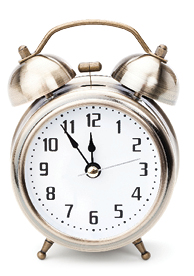
By Jeff Davidson
Years back, the director of Stanford University’s sleep center concluded most adults ”no longer know what it feels like to be fully alert.” The National Sleep Foundation found that almost 68 percent of adults are getting too little sleep, and 58 percent suffer from some type of insomnia at least once a week.1 These people are not simply a little groggy or sluggish, but completely and undeniably walking around as if in a stupor.
As a highly productive professional, you’ve probably already discovered that when you shortchange your sleep too often, your mind and body simply don’t respond anywhere near optimal capability. What you do the night before significantly affects your ability to get things done.
Most experts agree that losing three to four hours of sleep once a week won’t cause any long-term problems. You might feel terrible the next day, but you can recover somewhat by going to bed earlier the next evening or napping if that is an option for you. You might have to force yourself to get into bed at 9 p.m. on evenings when you’d rather be up and about, but do it. Your body will thank you.
If you’re missing out on more than 10 hours a week, decide to catch up on your sleep now before you further diminish your capabilities. Recovery might take a month or more, but it will be worth it.
The Body’s Clock
Heart beats, breathing, speaking, and even hiccupping have their own rhythm. If you sleep too little or for that matter too much, you disrupt your internal cycles that required millions of years to evolve.
Each of your body’s functions is reset every 24 hours, which parallels the natural daily light cycle. The essence of your being is subject to this circadian rhythm, which is the daily cycle of activity in living organisms. Altering that rhythm for a prolonged period will prove to be contrary to your own physiology.
Martin Moore-Ede, a former professor at Harvard Medical School and founder of CIRCADIAN,® a research and consulting firm dedicated to improving productivity, health, and safety in round-the-clock operations, observed that certain times of the day are important to sleep through, including between 2 a.m. and 5 a.m., when human physiology is at its lowest level of alertness. Highest alertness, by the way, is between 9 a.m. and noon, and also 4 p.m. to 8 p.m.
If you happen to be short on sleep some particular day, such light exercise as stretching or a brief walk is a good idea. Your energy level may perk up for an hour or two. If you have the opportunity to nap, that would help as well.
All About Napping
Napping increases your alertness for the rest of the day. Some people nap easily; others can’t seem to nap at all. You already know into which camp you fall. The best nap time is between 2 p.m. and 3 p.m. Any later and your nap may be too deep, interfering with your nightly sleep.
While naps can be helpful, they are not a good substitute for regularly getting the right amount of sleep. It’s best not to use naps to catch up on sleep if you shortchange yourself nightly.
Your quality of sleep will be much higher and the immediate benefits more apparent if you nap in a bed or cot as opposed to a chair. Although everyone feels a little groggy for a few minutes after a nap, this gradually subsides.
Short naps are more productive than long naps. A short nap will leave you refreshed; a long nap could interfere with your sleep that evening. Naps of 20 minutes or less usually help avoid REM sleep, a deep-sleep stage from which you’re likely to wake up groggy and stay that way.
To derive the most from your nap time, safeguard the nap area before you nod off by making sure that phones or other gadgets will not disturb you. Post a “Do Not Disturb” sign if that will help.
You might need to readjust your sleeping habits or your pre-bedtime rituals, but getting enough sleep is vital to having enough energy to successfully get through your workday. Most definitely, how you sleep is how you work.
ENDNOTE
1 http://sleepfoundation.org/sleep-disorders-problems/insomnia.
Jeff Davidson, MBA, CMC, is principal, Breathing Space® Institute, Raleigh, North Carolina (www.BreathingSpace.com or Jeff@Breathingspace.com). An author and presenter on work-life balance, he holds the world’s only registered trademark from the United States Patent and Trademark Office as “The Work-Life Balance Expert.”®
New, Reduced Membership Dues
A new, reduced dues rate is available for CAOs/ACAOs, along with additional discounts for those in smaller communities, has been implemented. Learn more and be sure to join or renew today!
